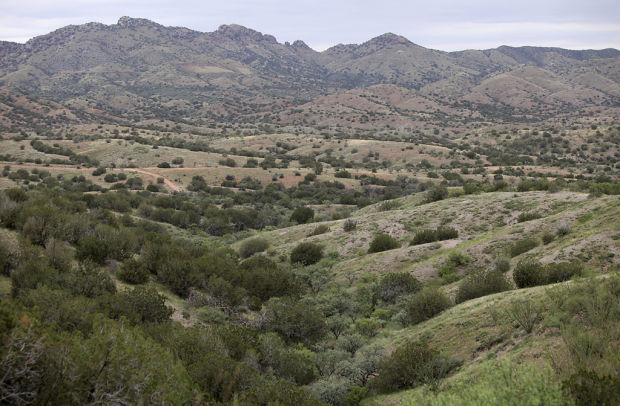It’s one more government approval down, two to go for the proposed Rosemont Mine.
The Arizona Department of Environmental Quality announced Wednesday that it has issued a final certification — with lots of conditions attached — that the mine will meet state water quality standards.
This certification is needed for Rosemont Copper to get a federal Clean Water Act permit from the Army Corps of Engineers to dredge and fill several streams lying near the mine site and upstream of the state-protected Cienega Creek and Davidson Canyon, southeast of Tucson.
A previous step, ADEQ’s tentative certification for the mine issued nearly a year ago, was contested by the U.S. Environmental Protection Agency, the Arizona Game and Fish Department and Pima County. They expressed concerns that the mine could pollute surface water.
But now, the ADEQ believes that if Rosemont adheres to the conditions it has imposed on the project, as well as those that the Army Corps would impose if it issues its permit, and other state and federal permitting and mitigation requirements, “the project will neither cause nor contribute to degradation of downstream surface waters,” ADEQ spokesman Mark Shaffer said Wednesday in an email.
It’s the third approval that the ADEQ has given Rosemont for the 4,500-acre mine that would be sited on public and private land in the Santa Rita Mountains southeast of Tucson. The ADEQ also has issued an air quality permit and a groundwater aquifer protection permit for the $1.2 billion project that would mine 243 million pounds of copper a year. Both permits are being challenged in court by opponents.
Besides the still-unresolved U.S. Army Corps permit, the mine also needs a final approval from the U.S. Forest Service before it can start construction. It’s not clear when either of those decisions will occur but the Corps probably won’t make a decision on its permit until the Forest Service makes its final decision on the mine.
In a prepared statement, Patrick Merrin, a vice president for Rosemont Copper’s Toronto-based parent company, called the state approval an important milestone and a key component for the federal approvals.
“HudBay’s leadership remains committed to the approval process and supporting the regulators by providing the plans and information they require,” said Merrin, vice president of HudBay Minerals’ Arizona Business Unit. “We remain optimistic the final steps will be accomplished in a timely manner, satisfying all requirements and delivering permits that will help build a mine that creates jobs, complies with the environmental permits and requirements, and strengthens the local economy.”
Opponents called ADEQ’s approval another sign that the state is putting a foreign company’s profits ahead of protecting the state’s water.
“They issued the conditional certification before they even know what the final project will be. There are no federal approvals yet including the critical Clean Water Act permit,” said David Steele, a spokesman for opposition group Save the Scenic Santa Ritas, referring to the fact that the Forest Service hasn’t formally selected a mining plan although it’s tentatively picked one.
“And even HudBay says that they are going to do a second round of exploratory drilling to improve their understanding of the project. They don’t even know what the project will look like,” said Steele, referring to a HudBay news release from January announcing additional drilling at the site.
The Jan. 15 news release said, “In Arizona, an additional drilling program is planned for 2015 focusing on continuing to improve our understanding of the initial years of mining as well as plant site geotechnical work.”
In response to public comment last year, ADEQ required Rosemont to prepare a Surface Water Mitigation Plan detailing the monitoring it will do, and to develop a surface water model to predict changes in surface water runoff and sediment because of the project.
Rosemont must also identify measures that it will implement should these potential changes have the possibility to impact downstream water quality, the state regulators said.
As it now stands, the mine won’t violate applicable surface water quality standards for McCleary, Wasp, Trail, Barrel and Davidson canyons and Cienega Creek, the state said. The latter two streams are classified by the state as outstanding waters, meaning their water quality can’t legally be degraded. Their health and future water supply have been among the centerpiece issues standing in the way of the mine’s approval after nearly eight years of permitting efforts by the mining company.
“We share the public’s concern about impacts to water resources and have worked diligently to insure that this certification meets all environmental protection requirements,” ADEQ Director Henry Darwin said in a prepared statement. “The surface water mitigation plan will provide ADEQ and the Forest Service with ongoing data and provides for mitigation measures, should they be needed, to ensure protection of Davidson Canyon and Cienega Creek, both Outstanding Arizona Waters.”
A year ago, the EPA, Pima County and Game and Fish raised more than 20 written concerns challenging ADEQ’s conclusion that the mine won’t violate surface water quality rules. The EPA said the evidence indicates a “substantial risk” of violating state standards protecting fish, wildlife and habitat.
The federal agency had said the ADEQ relies too much on plans for corrective action if pollution occurs and not enough on prevention. Game and Fish challenged the adequacy of much of the mine’s data, warned that the mine’s sediment control facilities won’t hold up in big storms, and urged much more detailed ADEQ reviews of the potential for pollution from the mine.





